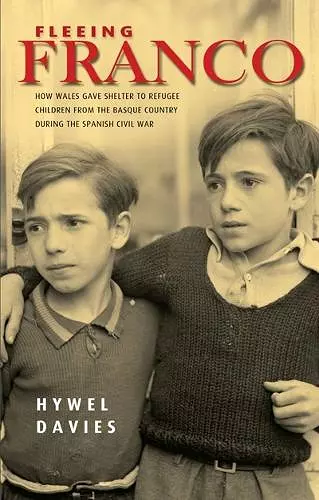Fleeing Franco
How Wales Gave Shelter to Refugee Children from the Basque Country During the Spanish Civil War
Format:Paperback
Publisher:University of Wales Press
Published:28th Feb '11
Currently unavailable, and unfortunately no date known when it will be back

This book tells the story of the Basque children who came to Wales during the Spanish Civil War. In 1937, with civil war raging in Spain, 3,862 Basque children fled their country. They were packed on an old cruise liner that left Bilbao for Southampton. Throughout the summer children were dispersed to camps throughout Britain. Eight of those colonies were in Wales. The welcome they received here was a mixture of hostility and kindness. In Brechfa (Carmarthenshire) there was a notorious incident that confirmed the reluctance of many to accept exiles, while elsewhere in Wales, from Caerleon to Colwyn Bay there were many examples of great generosity.
Fleeing Franco How Wales Gave Shelter to Refugee Children from the Basque Country during the Spanish Civil War Hywel Davies University of Wales Press, Cardiff ISBN 978-0-7083-2336-6 Reviewed by Colin Carritt April 2011 In 1936 there existed a remarkable polarisation between the establishment of government and the press, and the ordinary working people of Great Britain. The press and the Stanley Balwin's Tory cabinet were implacably opposed to the Popular Front government in Spain, but the general public were far more sympathetic. A groundswell of support grew in Britain for the Spanish people and in particular for the care of refugee children fleeing the Civil War. And the region of the UK most outspoken in its support was Wales. The message that comes across time and time again in Hywel Davies book, Fleeing FrancoA", is of the unremitting good will, the solidarity, the generosity and the sheer loveA" (there is no other word for it) of the working class people of South Wales. Davies book is remarkable in being that rare combination of well researched and annotated study and also a series of riveting accounts of the personalities involved, the children (nioos) and their carers, their joys and their sorrows. Davies explains that despite the hostile press, there was, in South Wales, a genuine identity with the Basque people. Euskadi is defined by its iron ore and its mining; it is surrounded by towering mountains clothed in green lush vegetation. So are the Welsh valleys. For centuries, both communities have exported the products of their labours far and wide and in the process have become great seafaring nations. Both communities have experienced real and gut wrenching poverty in the 20th century and have responded by building solidarity amongst their ranks with strong trade unions and social traditions. Thus, both the geography and the economics have resulted in the development of close links between the two peoples, and long before the Spanish conflict, a sizeable immigrant Basque population had established itself in South Wales. When the refugee children arrived at Southampton in the old cruise ship HabanaA", accommodation was secured and arrangements drawn up for the provision of four colonies in Wales. One was to be in Caerleon, near Newport, one at Sketty in Swansea, one in the wilds of Carmarthen, at Brechfa, and the fourth at Old Colwyn in North Wales not far from Llandudno. Davies takes each of the colonies in turn and carefully, and with great compassion, tells of the individual strengths and weaknesses of each establishment. He introduces us to the nioos and their stories and to their supervisors, the teachers, the cooks, the foster parentsA" and the volunteers. Cambria House at Caerleon was a place of healing and settlingA" under the compassionate management of Cyril Cule. As Caerleon was a success, so the colony in the remote countryside at Brechfa was a disaster and it significantly soured relationships between the refugees and public opinion. The press were only too eager to leap upon the apparent disorder at Brechfa to condemn the whole humanitarian enterprise and to regurgitate the demands for early repatriation of the children. Sketty, a suburb of Swansea, identified more closely with the Basque region of Spain than even other parts of South Wales. Whereas Caerleon and Sketty were well run and successful, Old Colwyn in North Wales, whilst also a well run and happy colony, suffered always from a shortage of funding. It was a small colony with just 20 ninos and on their arrival on each child's bed was a small toy. The local community was quickly won over by the children who were well behaved and presentable. Fleeing FrancoA" is an important and readable account of the humanitarianism of the South Wales people and I commend it to all readers of the BC37A:UK Newsletter. Colin Carritt April 30th 2011
ISBN: 9780708323366
Dimensions: unknown
Weight: 272g
192 pages